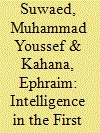|
|
|
Sort Order |
|
|
|
Items / Page
|
|
|
|
|
|
|
| Srl | Item |
| 1 |
ID:
158534


|
|
|
|
|
| Summary/Abstract |
Intelligence skills and security awareness were consistent with the rise and spread of Islam as a new religion.1 According to Muslim tradition, Muhammad habitually sought solitude on Mount Hiraa, near Mecca. One night in the year 610 AD, he had an epiphany: the angel Gabriel appeared in a dream and ordered him to read, but Muhammad refused. Some claim that he was afraid of the magnitude of the mission, while others claim that he was simply illiterate. But when the angel insisted, he read certain verses from the Qur’an. When he awoke he returned home, telling his wife Hadija about the epiphany. Hadija was to first to realize that it was a revelation, and that Muhammad was the emissary of the Lord. Becoming the first believer, Hadija thereafter supported Muhammad every step of the way. Without her it would have been extremely difficult for him to accept the burden of the revelation and the divine mission. See: The Holy Qur’an, Chapter 53—An-Najm (The Star), Verse 4; The Holy Qur’an, Chapter 96—Al-‘Alaq ((The Clot), Verses 1–5;
Emory C. Bogle, Islam: Origin and Belief (Austin: University of Texas Press, 1998), p. 6.
[Google Scholar][Google Scholar]
In its first three years of inception, Islam was an underground movement. The prophet Muhammad (570–632 AD) realized that, due to the hostility of the dominant majority in Mecca, he had to be cautious of his moves and intentions and those of his followers. What was becoming a new religion was revealed to only his most carefully selected and loyal associates. The Prophet knew that, in the preliminary stage, any information spillage could lead to harsh responses from the local civil and spiritual leaders, including measures to suppress this new religious movement. Thus, he adopted secrecy, regarding not only the identity of his selected recruits/believers but also the location of their meeting place—the house of Islam—a secret safe house where he met and preached to those he invited to join the new religion.
|
|
|
|
|
|
|
|
|
|
|
|
|
|
|
|
|
|
|
|
|